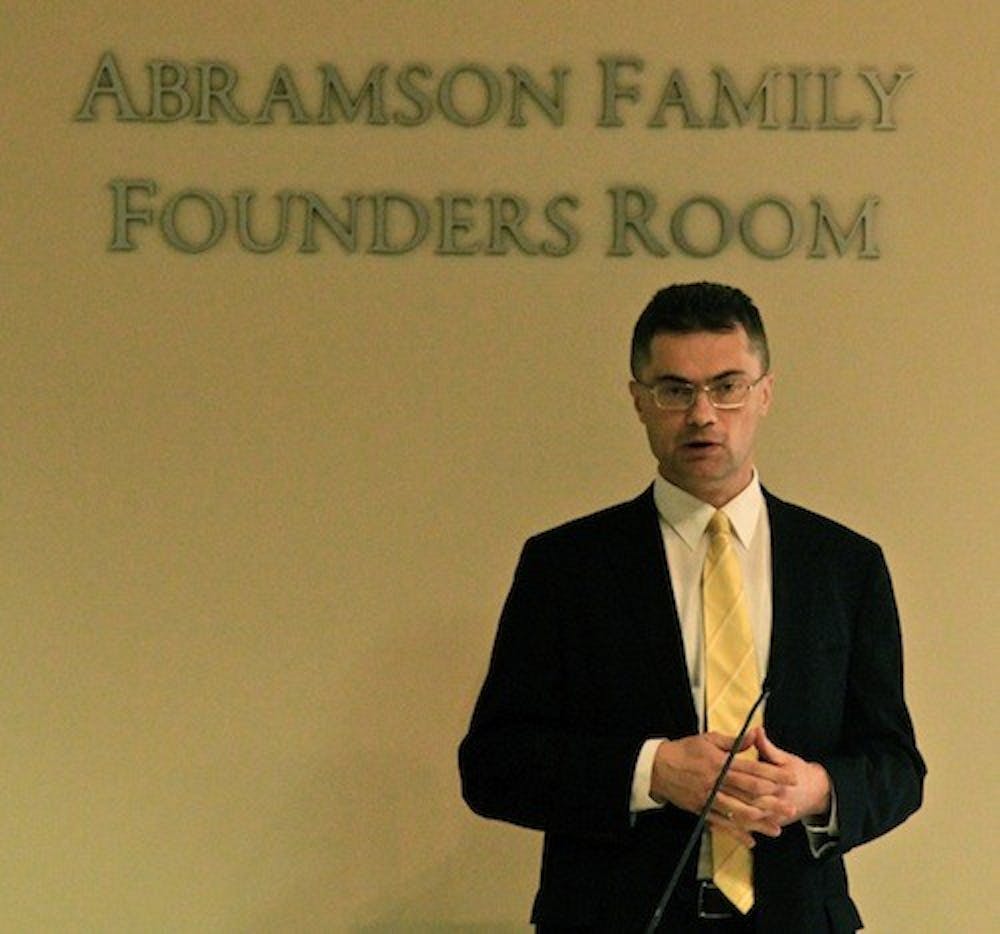The ambassador to the United States from Bosnia and Herzegovina spoke at AU the same day his country finished 16 months of negotiations for the makeup of its new government.
“I’m amazed, it’s a big achievement for us,” Ambassador Mitar Kujundzic said Feb. 10.
Kujundzic spoke for about an hour to an audience of 35 people in the School of International Service Founders Room as the first speaker in the Balkan Lecture Series.
The International Politics Student Organization, a new group promoting discussion about international issues, organized the series.
The country held its fifth democratic elections in October 2010 with both the Social Democratic Party and the Alliance of Independent Social Democrats getting the same number of seats in parliament.
It took 16 months after the election for the winning parties to decide how to divide the position of prime minister and the makeup of the cabinet, according to the Associated Press.
Vjekoslav Bevanda is the new Prime Minister, according to the same report. He is a member of the Croatian Democratic Union of Bosnia and Herzegovina and was a former finance minister.
Kujundzic said he recognized how weird it sounds to Americans for a country to be without part of their government for so long. He talked about why it was necessary to have such a system.
“Multiethnic democracy is particularly difficult because you need to have agreement not only by winners of the last election, but also all national political forces,” he said.
Bosnia and Herzegovina gained its independence from former Yugoslavia in 1992. A brutal conflict followed, during which members of the Army of Republika Srpska committed acts of genocide against Bosnian Muslims. The country is made up of ethnic Bosniaks, Serbs and Croats.
Kujundzic said he believes these groups have learned to live with each other, despite historical tensions.
“There is such a complex political structure and it takes a long time to negotiate every political decision, but this is the necessity of democracy in our country,” he said.
Kujundzic hopes his country will be able to join North Atlantic Treaty Organization between the next three to six years and the European Union between the next 10 to 15 years in order to join a prosperous international community.
“We perceive NATO as probably the most successful international organization, besides the EU, in the whole history of humankind,” Kujundizic said.
However, Kujundizic said there is opposition to NATO in Bosnia and Herzegovina. Some citizens oppose it because the organization bombed Srpsksa, a region in Bosnia and Herzegovina, in 1995 during the Bosnian War.
Kujundizic did not believe this would be a barrier to joining the organization because those who do not completely support NATO membership do not feel strongly enough to block a decision.
David Park, a senior in SIS who partook in the Washington Semester Program last semester that studied the conflict in the former Yugoslavia, spent 23 days in Bosnia and Herzegovina, Serbia and Croatia talking to high government officials and locals.
“I’m glad the ambassador had much more reasonable predictions about the timeframe for membership in the EU and NATO than officials who we talked to, who seemed much more optimistic,” said Park.
However, Park met with many in Bosnia and Herzegovina who were very against NATO membership and with those who were worried the government was avoiding talking about reconciliation issues from the Bosnian War.
Kujundizic praised the close relationship between the U.S. and Bosnia and Herzegovina. The United States helped form the peace agreement at the end of the Bosnian War and gives a large amount of foreign aid to the country.
The ambassador talked about the current economic situation in Bosnia and Herzegovina, which he described as “very, very bad.” He also discussed the country’s refusal to recognize the state of Kosovo, as well as other political problems within the country, such as the misrepresentation of Croats in the political system.
However, Kujundizic stressed the stability of the country.
“All countries in this region are very constructive, cooperating very well in good neighboring relations ... and there is no fear of military conflict,” he said.
news@theeagleonline.com





